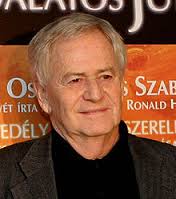
THE GREEN BIRD
Germany, 1980, 94 minutes, Colour.
Hannelore Elsner, Peter Andorai, Krystyna Janda.
Directed by Istvan Szabo.
The Green Bird is a West German production by Hungarian director Istvan Szabo. Many of his Hungarian technicians and his leading actor worked with him in this film. It is a familiar story: a relationship that endures for many years, despite the marriage of the hero. What makes it different is that the hero is a Pole, the heroine a West German. They meet at medical conventions every so often. The film traces (with constant allusion to political situations of the '60s and '70s) of their relationship. While the ingredients are those of soap opera, the treatment is understanding and humane. Szabo made many fine Hungarian films in the '60s and '70s e.g. Confidence and then went on the award-winning Mephisto.
1. A humane story, love story, sad and happy relationship story? A portrait of love and pain? The reality of the film, its authenticity - and open-endedness?
2. The work of Istvan Szabo: Hungarian films, perspective? His work in the West? Germany and Poland as the countries of his screenplay? The importance of the background of way of life in East and West? Freedom and lack of freedom? The relationship and its being a symbol of the relationships between East and West? The local interest of the film? Universal impact?
3. The portrayal of Europe: Poland and Warsaw: Germany, Austria, France: the cities, hospitals. hotels, restaurants, scenic beauty? The importance of the silent and contemplative visit to Auschwitz?
4. Editing and pace: the sprightliness of the encounter, the light touch of the initial years, the contrast with the domestic scenes at home, as the affair moved into longer years, the longer pace of various sequences? The brevity of quick encounters? The communicating the differing tempos of the various years as they passed?
5. The title, its use, reference to Renate? The references throughout the film? Images? The elusiveness of the green bird?
6. The credibility of characters and situations? The encounter, the progress of the affair. the passion. the effect of time, the dilemmas for Jan and Renate. the companionship, the friendship, the breaks, new decisions, failure to make decisions, ageing, the passing of time - and the continuing relationship?
7. A portrait of passionate emotion: from encounter, infatuation, love, passion, deception, selfishness. sacrifice, loss, envy. jealousy, trust, attempts to build anew?
8. The voice-over technique and its inviting the audience to understand - and partly distancing? overcoming the difficulties of the use of English and French, German and Polish? The screenplay focused on Jan? The screenplay's presenting the situations as fact - almost without judgment? Editorial judgments on the characters? The portrayal of Katzka as a point of reference?
9. The importance and emotional overtones of the relationship as a symbol of East and West? Ways of life, ideologies, personal freedoms , pain of separation? The symbols portraying this e.g. the transit lounge and the glass wall between Jan and Renate?
10. The portrait of Jan in himself: career, the film taking his success for granted, language, passion, cold relationship with Katzka, deceiving but never hurting her, passion for Renate, sharing and passing the time with her, the visit to Auschwitz, transit lounges, formalities and informalities, the various meeting places, the presence of Werner, the tears, the marriage, Annette and his playing with her, the breakdown of the marriage and the resumption of the affair? Age - as symbolised by Renate's comment on his eyes?
11. Renate in herself, her work, attractiveness, response to Jan, decisions, the visit to Auschwitz, so much sharing, the passing of the gears, the pain, seeing her at work, the relationship with Werner, the social with the two husbands and wives, the growing friendship with Katzka, the correspondence and its lapses over the years, the cards, the birth of Annette? Re-meeting Jan and the break-up of the marriage to Werner?
12. The sympathetic portrait of Katzka - and her reading the news, her relationship with Jan, her not suspecting, illness. meeting Renate, friendship? The contrast with Werner and the bond with Renate -but his self-preoccupation?
13. The importance of the historical background - the portrayal of the major world events over the '60s and '70s? Situating the love story on the political world?